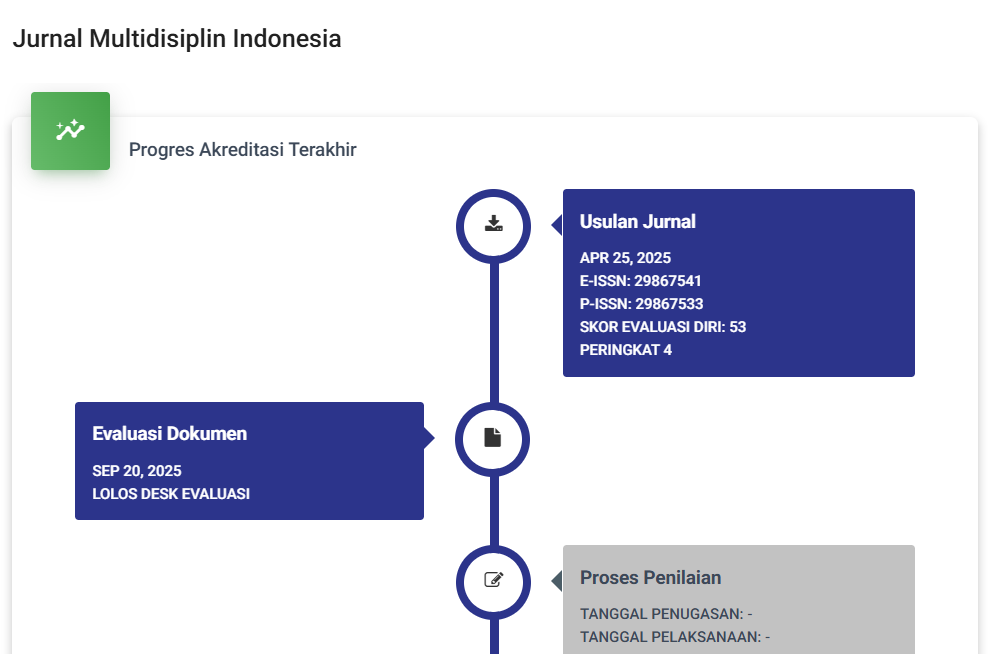Transformation of Indonesian Police Human Resources Management in The Digital Era: Opportunities and Challenges
DOI:
https://doi.org/10.62007/joumi.v3i2.507Keywords:
Digital transformation, HR management, POLRI, digital eraAbstract
This study aims to examine the transformation of human resource management (HR) in the Indonesian National Police (POLRI) in facing the digital era, by highlighting the opportunities and challenges that arise. The method used is a qualitative approach with data collection techniques through in-depth interviews with POLRI personnel and literature analysis (library research) on policies, regulations, and previous studies related to the digitalization of HR management. The research results indicate that digitalization opens up opportunities for recruitment efficiency, e-learning-based training, and real-time performance monitoring. However, significant challenges were also found, such as limited technological infrastructure, resistance to changes in organizational culture, and the need to improve personnel's digital competence. The transformation of POLRI HR management requires adaptive strategies and visionary leadership to align digital demands with the values of police professionalism. This study is expected to be a strategic reference in the development of technology-based POLRI HR policies.
References
Amostian, Yusriyadi, & Silviana, A. (2023). Reformasi Polri melalui Penguatan Fungsi dan Kewenangan Komisi Kepolisan Nasional dalam Melakukan Pengawasan Eksternal terhadap Polri. Jurnal Pembangunan Hukum Indonesia, 5(3), 510–522.
Anshar, R. U., & Setiyono, J. (2020). Tugas dan Fungsi Polisi Sebagai Penegak Hukum dalam Perspektif Pancasila. Jurnal Pembangunan Hukum Indonesia, 2(3), 359–372. https://doi.org/10.14710/jphi.v2i3.359-372
Azmy. (2015). Mengembangkan Human Resource Management yang Strategis untuk Menunjang Daya Saing Organisasi: Perspektif Manajemen Kinerja (Performance Management) di Bank Syariah. Binus Business Review, 09(66–78).
Christa, U. R., & Kristinae, V. (2021). The effect of product innovation on business performance during covid 19 pandemic. Uncertain Supply Chain Management, 9(1), 151–158. https://doi.org/10.5267/j.uscm.2020.10.006
Gaussyah. (2020). Revitalisasi Fungsi SDM Polri dan Anggaran Polri Menuju Kemandirian dan Profesionalisme Polri. Kanun; Jurnal Ilmu Hukum, 14, 61–93.
Harsch. (2020). Dynamic talent management capabilities and organizational agility—A qualitative exploration. Human Resource Management. Elshiver Journal International, 03, 25–33.
Indriasari. (2018). Pengaruh Kapasitas Sumber Daya Manusia, Pemanfaatan Teknologi Informasi dan Pengendalian Intern Akuntansi Terhadap Nilai Informasi Pelaporan Keuangan Pemerintah Daerah (Studi pada Pemerintah Kota Palembang dan Kabupaten Ogan Illir). Jurnal Ilmiah. Kumpulan Makalah Simposium Nasional Akuntansi XI, 23, 123–167.
Kabadayi, S. (2019). Commentary on “Humanistic Management of Social Innovation in Service (SIS): An Interdisciplinary Framework.” Humanistic Management Journal, 4(2), 187–189. https://doi.org/10.1007/s41463-019-00070-w
Kohli, R., & Melville, N. P. (2019). Digital innovation: A review and synthesis. Information Systems Journal, 29(1), 200–223. https://doi.org/10.1111/isj.12193
Moleong, L. J. (2004). Metodologi Penelitian Kualitatif (7th ed.). PT. Remaja Rosdakarya.
Mubarak, N., Khan, J., Ali, M., & Pesämaa, O. (2024). Roadmap to Achieve Green Project Performance: The Role of Knowledge Co-creation. Journal of the Knowledge Economy, 0123456789. https://doi.org/10.1007/s13132-024-01779-2
Nakir, M., Djati, P., & Arafah, W. (2020). The Effect of Strategic Leadership and Self-Efficacy on Organizational Commitment and Its Implication on Performance Defense Researchers. Integrative Business & Economics, 151(Icmae), 248–251. https://doi.org/10.2991/aebmr.k.200915.057
Nurbiyati, T. (2012). Learning Organization Sebagai Strategi Meningkatkan Keunggulan Kompetitif. Jurnal Wahana, 15(1), 51–60.
Nurcahyo, S. A., Jannah, R., & Anis, M. (2024). Maqasid Syariah Management in Realizing Sustainable Development Goals : Perspective of the Halal Tourism Industry. Journal Digital Marketing and Halal Industry, 4810, 175–192.
Nurcahyo, S., Widagdo, T., Sudiyono, S., & Ali, A. (2023). Strategic Study: Optimization of Strengthening Critical Thinking and Teamwork of the Marketing Division of PT Suzuki Mobil Sejahtera Trada Pemuda Semarang. https://doi.org/10.4108/eai.28-10-2023.2341813
Oktania. (2016). Hubungan Persepsi Tentang Citra Polisi Lalu Lintas Dengan Kepatuhan Berlalu Lintas Pengendara Sepeda Motor Dibedakan Berdasarkan Jenis Kelamin. Moderat: Jurnal Ilmiah Ilmu Pemerintahan, 01, 79–92.
Orlova, E. V. (2021). Design of personal trajectories for employees’ professional development in the knowledge society under industry 5.0. Social Sciences, 10(11). https://doi.org/10.3390/socsci10110427
Pudi, R. (2007). Hukum Kepolisian (Profesionalisme dan Reformasi Polri) (3rd ed.). Laksbang Mediatama.
Radin, D. N., Shaharuddin, N., Bujang, I., & Rijanto, I. F. (2024). The Interaction of Maqasid Al-Shariah in the Relationship Between ESG and Firm Financial Performance. ASEAN Journal on Science and Technology for Development, 41(2), 210–216. https://doi.org/10.61931/2224-9028.1580
Sadjijono. (2008). Seri Hukum Kepolisan, Polri dan Good governance (2nd ed.). Laksbang Mediatama.
Sapwan, S. (2023). Peranan Brimob Polri Dalam Pengamanan Obyek Vital. Jurnal JURISTIC, 4(03), 347. https://doi.org/10.56444/jrs.v4i03.5338
Sugiyono. (2013). Metode Penelitian Pendidikan Pendekatan Kuantitaif, Kualitatif, dan R&D. Bandung CV alfabeta. Metode Penelitian Pendidikan Pendekatan Kuantitaif, Kualitatif, Dan R&D, 283–393. https://doi.org/10.1007/s13398-014-0173-7.2
Suripto. (2012). Manajemen SDM Dalam Persfektif Ekonomi Islam. Jurnal Ekonomi Syariah Indonesia, 02, 49–57.
Untung, R. (2003). Kedudukan dan Fungsi Polisi Republik Indonesia Dalam Sistem Ketatanegaraan (berdasarkan UUD 1945) (1st ed.). CV. Utomo Mulya.
Yosefrinaldi. (2019). Pengaruh Kapasitas Sumber Daya Manusia dan Pemanfaatan Teknologi Informasi Terhadap Kualitas Laporan Keuangan Pemerintah Daerah Dengan Variable Intervening Pengendalian Intern Pemerintah (Studi Empiris pada Dinas Pengelolaan Keuangan dan Aset Daerah Se-Su. Managament Insight: Jurnal Ilmiah Manajemen, 13, 43–63.
Downloads
Published
How to Cite
Issue
Section
License
Copyright (c) 2025 Elka Rudlof Saputro Nugroho, Pudji Astuty

This work is licensed under a Creative Commons Attribution-ShareAlike 4.0 International License.







